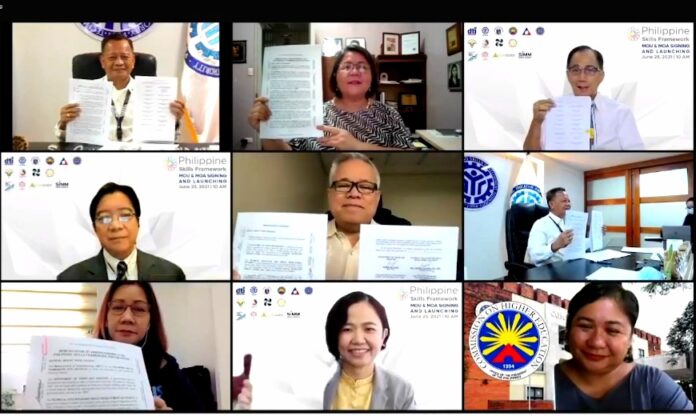
-
11 government education and sector agencies launched the Philippine Skills Framework (PSF) initiative, which aims to reskill and upscale the country’s workforce
-
Also signed was a memorandum of agreement on the PSF for Supply Chain and Logistics, a framework created to advance competitiveness and future-readiness of the logistics workforce through training and skills development
-
TESDA will provide scholarship programs to the logistics services sector on existing training regulations and non-existing programs on industry-specific training requirements
-
PSF is an inclusive innovation strategy to equip the country’s workers with skills mastery and prepare them for the future economy by providing industry-specific skills frameworks
Eleven government education and sector agencies on June 25 signed a memorandum of understanding (MOU) launching the Philippine Skills Framework (PSF) initiative. The project aims to reskill and upscale the country’s workforce, with logistics and supply chain as the pilot industry.
A memorandum of agreement on the PSF for Supply Chain and Logistics (PSF-SCL) was signed virtually on the same day by four government agencies and 16 industry association groups.
The PSF is an inclusive innovation strategy that seeks to equip the country’s workforce with skills mastery and prepare them for the future economy, especially for the fourth industrial revolution (4IR) or Industry 4.0, by providing industry-specific skills frameworks.
The initiative resulted from an MOU to cooperate in human capital development that was signed in 2019 by the Philippines and Singapore. The Philippines was represented by the Department of Trade and Industry (DTI) and Technical Education and Skills Development Authority (TESDA), while Singapore was represented by SkillsFuture Singapore, an arm of Singapore’s Ministry of Education. The PSF initiative was produced by referencing the Singapore Skills Framework.
“The need to reskill and upskill our human capital and workforce remains a crucial part of our plans. This is essential so that our industries can increase and sustain their competitiveness under the 4IR and move us closer to our goal of becoming an industrialized nation,” Trade Secretary Ramon Lopez said in a statement during the PSF launching.
TESDA director general Isidro Lapeña said the PSF “is developed by and for the industry” in the same way that TESDA’s training regulations are developed.
Under the MOU, the parties commit to coordinate and collaborate to develop the country’s human capital and workforce for the 4IR, and upgrade workers’ skills for the future economy.
Interagency efforts will involve the development of sector-specific skills frameworks that will provide guidance on how to enhance the skills of the country’s workers for particular job roles.
Priority agencies identified
Eight priority agencies were identified under the initiative, namely: logistics and supply chain, construction, information and technology-business process management, tourism, food, health and wellness, manufacturing, and creative industries. Each PSF for the priority industries is being developed with the private sector to ensure it answers to the requirements and demands of the industry.
Of the initial priority industries, the PSF for the logistics and supply chain is the first to be finished, taking six months to complete.
Every PSF will include sectoral information, career maps and pathways, occupations and job roles, corresponding technical and generic skills and competencies for critical work functions and tasks, and the learning programs guided by the skills and competency requirements of particular occupations.
Its aim is to guide employees in the areas of education and career planning; training for reskilling and upskilling; and career progression.
The PSF is also seen as a useful tool for employers in recruitment, talent management, staff deployment, training and development, performance and rewards management.
For education and learning providers, benefits seen include sector training program development; curriculum development and updating; content alignments; and career guidance.
For the government, unions and professional bodies, the PSF will help in policy formulation, skills manpower intervention, and building workforce professionalism.
The PSF will be harmonized with the Philippine Qualifications Framework and all other relevant laws and regulations.
A Philippine Skill Council has also been set up to provide directions and guidelines on the development of the framework, with the PSF to be revisited every two years.
The PSF-SCL has been created to ensure a competitive and future-ready logistics workforce through training and skills development.
Under the MOA, TESDA will provide scholarship programs to logistics services sector on existing TESDA training regulations and non-existing programs on industry-specific training requirements identified by DTI, TESDA, and the logistics associations.
DTI is responsible for establishing camaraderie between TESDA and the logistics associations.
The logistics associations will provide manpower requirements that will participate in TESDA scholarship and training programs as well provide and support the skills trainings of TESDA.
The PSF-SCL was created by DTI through its Supply Chain and Logistics Management Division, in partnership with the Philippine Trade Training Center, TESDA, Thames International Business School, Accelebator SG, and Singapore Institute of Materials Management. It was also developed in cooperation with stakeholders in the Philippine logistics industries—employers, practitioners, industry associations, education and training providers, and unions.
The four tracks of the PSF-SCL are warehousing, supply chain and logistics operations (transportation), freight forwarding, and logistics information technology.
The PSF-SCL methodology references the Singapore Skills Framework for Logistics, and then is contextualized by Filipino subject matter experts to adapt the framework to the Philippine industry scenario. Gothong Southern Shipping Lines, Inc., Onestop Warehouse Solutions, Inc., and Producers Connection Logistics, Inc. participated in the pilot of the PSF-SCL.
Moving forward, the plan is to engage higher education and learning institutions to align the curricula with logistics needs/demands for learning facilitation.
An electronic copy of the PSF-SCL is available on DTI’s Logistics Observatory website at observatory.dti.gov.ph. – Roumina Pablo




